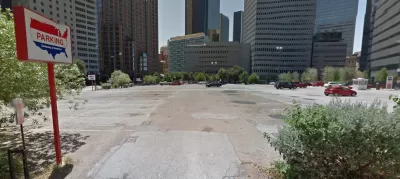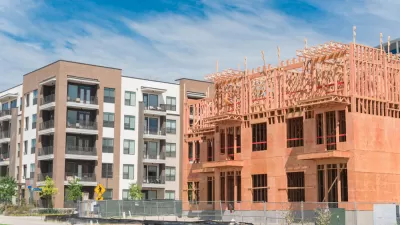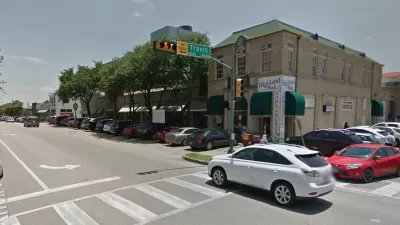Dallas has launched an effort to reform its "burdensome" parking policies, which have been left largely in the hands of local development districts.

In Dallas, a city where parking requirements have not changed in 60 years, city staffers have undertaken an effort to review and reform the city's parking regulations and overhaul its "byzantine permitting process," reports Peter Simek in D Magazine.
As cities around the country reckon with the legacy of parking requirements, planners are evaluating the effects of mandatory parking minimums—and policies that reduce them—on the urban fabric. "It is now clear that burdensome parking policies can drive up the cost of development, make it harder for new businesses to open and for developers to build affordable housing, incentivize the demolition of historic properties, and contribute to environmental dangers like the urban heat island effect." Oak Cliff City Councilman Chad West initiated the effort to reform Dallas-area parking last year, when, as chair of the Housing Committee, he "led something of a crusade to overhaul the city’s byzantine permitting process."
Andreea Urdea, a Romanian-born urban planner who trained and worked in Europe's compact, walkable cities, is leading the research arm of the project, which aims to reform Dallas's "lackadaisical approach to comprehensive planning" that has allowed zoning and land use regulations to be "continually adapted to fit the needs of every individual property owner," writes Simek. "Udrea’s job has been to research the parking rules, create local case studies that illustrate how those rules shape development, and examine ways other cities have reformed their approach to parking" in order to inform a future approach for Dallas. Udrea insists that her main task is to provide context. "Whatever approach Dallas takes to redrafting its parking regulations" she says, "will need to reflect an extensive community engagement process and be adopted by elected officials."
FULL STORY: She Came to Fix the Parking

Florida Considers Legalizing ADUs
Current state law allows — but doesn’t require — cities to permit accessory dwelling units in single-family residential neighborhoods.

Manufactured Crisis: Losing the Nation’s Largest Source of Unsubsidized Affordable Housing
Manufactured housing communities have long been an affordable housing option for millions of people living in the U.S., but that affordability is disappearing rapidly. How did we get here?

Research Shows More Roads = More Driving
A national study shows, once again, that increasing road supply induces additional vehicle travel, particularly over the long run.

EV Chargers Now Outnumber Gas Pumps by Nearly 50% in California
Fast chargers still lag behind amidst rapid growth.

Affordable Housing Renovations Halt Mid-Air Amidst DOGE Clawbacks
HUD may rescind over a billion dollars earmarked for green building upgrades.

Has Anyone at USDOT Read Donald Shoup?
USDOT employees, who are required to go back to the office, will receive free parking at the agency’s D.C. offices — flying in the face of a growing research body that calls for pricing parking at its real value.
Urban Design for Planners 1: Software Tools
This six-course series explores essential urban design concepts using open source software and equips planners with the tools they need to participate fully in the urban design process.
Planning for Universal Design
Learn the tools for implementing Universal Design in planning regulations.
City of Moreno Valley
Institute for Housing and Urban Development Studies (IHS)
City of Grandview
Harvard GSD Executive Education
NYU Wagner Graduate School of Public Service
City of Cambridge, Maryland
Newport County Development Council: Connect Greater Newport





























